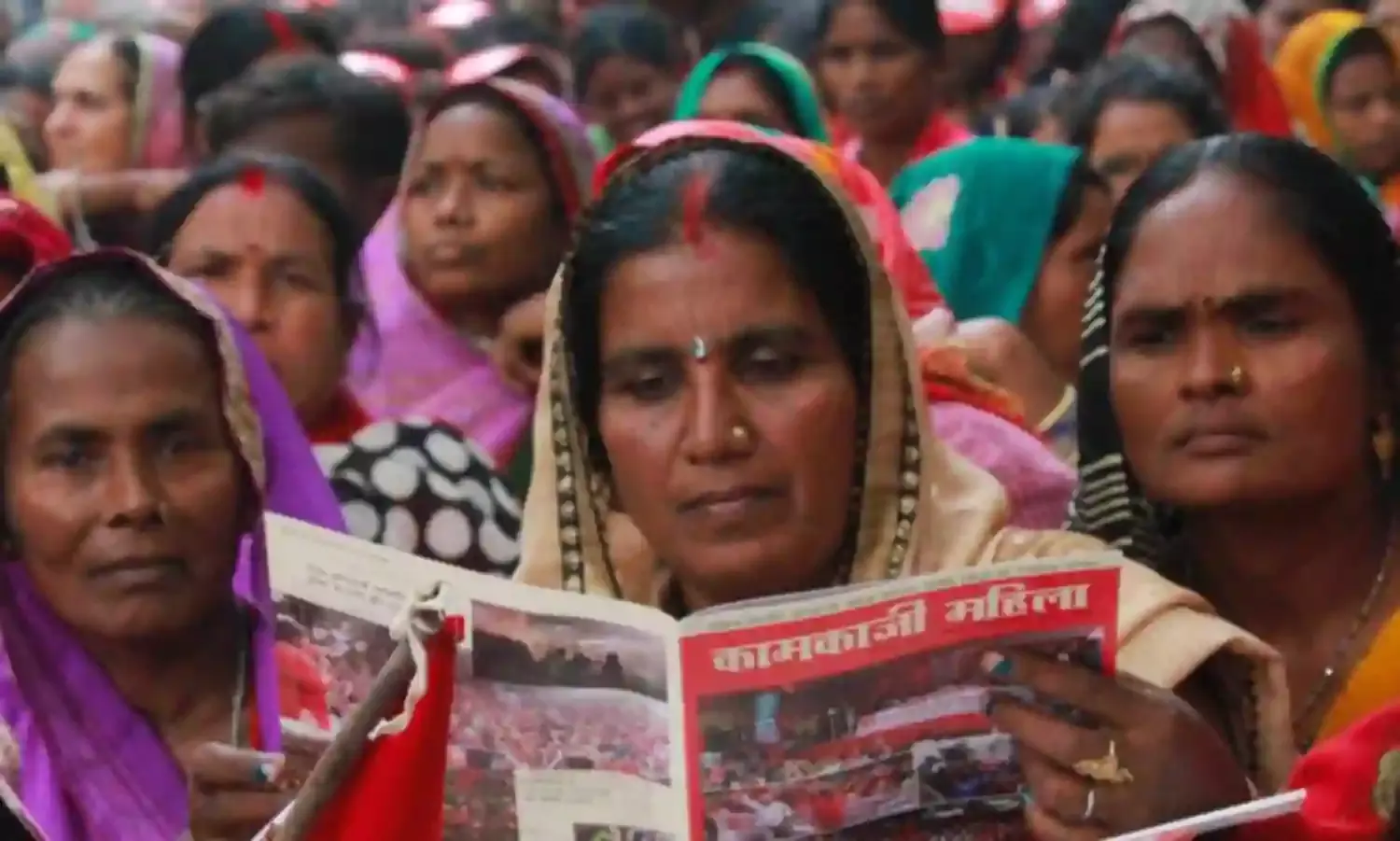Women Farmers Take the Modi Govt to Task At A Special ‘Session’ on Parliament Street
Women Farmers Take the Modi Govt to Task At A Special ‘Session’ on Parliament Street
NEW DELHI: A novel and historic all Women Parliament was organized as the first session of the Kisan Mukti Sansad on Parliament street.Women drawn from all over India whose husbands had committed suicide, debt ridden, victims of the acute agrarian crisis, participated and spoke. In the process women farmers were brought out of the shadows on to the front stage by the 184 farmer organisations who organised and participated in the huge protest in Delhi. This was under the umbrella of the All India Kisan Sangharsh Coordination Committee.
The passion with which they spoke, their tales of deep sorrow, had many wiping tears as they listened to the testimonies. Many women carried photographs of their husbands claimed by the crisis and an indifferent government. Well known social activist Medha Patkar addressed the women, along with a host of other speakers.
But the session belonged to the women from the fields. Kavitha from Telangana blamed the policy of the government for the suicide of her husband. They incurred insurmountable losses with the failure of their cotton crop.
Manisha from Siddipet in the same state spoke of the suicides of both her parents, as they could not repay the loan borrowed from moneylenders. The sharks kept harassing them for repayment. “We had to borrow from them because they could not access bank credit as tenant farmers, we have come to Delhi to know from the Prime Minister whether he will help us, whether he is prepared to listen at all,” she said.
Prabhavati Swamy from Bidar in Karnataka spoke of her brother who had committed suicide because the input costs had shot up, and the remunerative prices for the produce was so low that he came under debt. And had no money to sustain his family. “Farm families are unable to educate their children properly due to paucity of funds and income,” she said.
Manjula from Haveri of the same state pointed out that even though 70% of all work in farming is being carried out by women, they are still being neglected. They are not given rights over the land, and this she said, also impacts as basically a lack of recognition of women farmers as farmers.
When Kantabai from Maharashtra narrated her story, many participants’ eyes welled up. Her daughter committed suicide as she did not want to be a burden on her parents and increase their debt with her education fees. “I am looking for my daughter on the streets of Delhi now”, she said. She added that women farmers are trapped in both the economic as well as social systems of exploitation.
Paniben Solanki from Gujarat spoke of her debt accumulating, with interest and more borrowings to seven lakh rupees. The returns from the farms have decreased and the existing market price is not enough to clear the borrowed loans.
Jheelaben Vasava spoke that the resources like jal, jungle and zameen are being snatched away from adivasi communities and the remunerative prices don’t exist for forest produce.
Khadeeja bi from Gujarat pointed out that in the wake of disasters floods and other calamities, no compensation mechanisms exist when crops are lost to it.
Heera of Uttarakhand highlighted the vulnerabilities and issues of single women, and also reiterated the point of lack of effective disaster compensation.
Ponnuthai of Tamil Nadu emphasised the need for seed sovereignty and how corporatisation of agriculture is taking away resources like water and seeds from farmers. She said that water was being diverted for big industry and the farmers were without water to irrigate their crops. She said that women farmers do not want chemical pesticides or GM seeds.
Charanjeet Kaur from Punjab said that the mechanization farming should stop as it takes away jobs. She also condemned the rampant privatisation that is underway in the sector.
Sanowar Bi of Madhya Pradesh said that the crop insurance scheme of the government is a total failure. She said that this had been created to make the insurance companies richer. She also pointed to the utter failure of the price deficit scheme in her state Punjab.
Rajbala Yadav of Haryana wanted the two main demands of demands of AIKSCC --remunerative prices and loan waivers---to be accepted by the government as immediate relief for the farmers.
Ramadevi of Andhra Pradesh shared her personal experience of how many young girls like her fall prey to trafficking rings, especially in drought prone areas where no effective disaster support is available. Uma Shankari from the same state read out the names of many women farmers who lost their spouses in farm suicide cases, and are still awaiting support from the government..
Pooja Ashok More of Swabhimani Shetkari Sanghatana, Maharashtra pointed out that “these suicides were a matter of structural discrimination and injustice against farmers. She blamed successive governments for willfully and systematically neglecting farmers and their issues”.
Dr Aradhana Bhargav of Madhya Pradesh demanded pension scheme for women farmers like the armed personnel. She also further said that farmers face greater repression from governments when they set out to secure their rights.
Sudha Ramachandran of All India Womens Democratic Association pointed out that no struggle could succeed without bringing women to the centre stage.
Medha Patkar pointed out that the inputs from the women farmers in the Kisan Mukti Sansad needed to be incorporated by the government while framing policy. She spoke of the struggle and the perseverance of women farmers, as they were clearly facing the brunt of a repressive political and social system.





